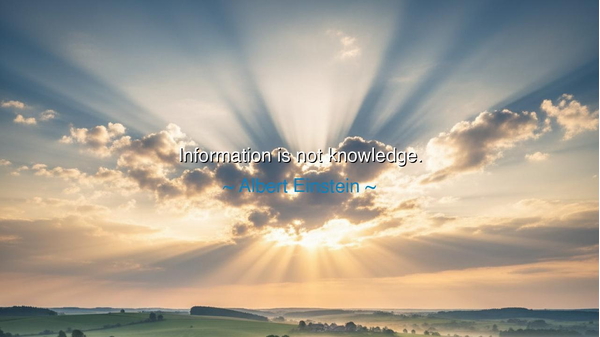
Information is not knowledge.






Hear the words of Albert Einstein, the seer of the cosmos, who proclaimed: “Information is not knowledge.” This saying, simple yet mighty, speaks to the heart of wisdom. For the world may flood us with facts, numbers, and voices, yet unless they are understood, shaped, and lived, they remain lifeless fragments. Information is like scattered stones upon the ground; knowledge is the temple built from them. The one who gathers without building has nothing but weight to carry, but the one who transforms gathering into meaning has a foundation upon which to stand.
The ancients knew this distinction well. A student could memorize the verses of the sages, but if those words did not transform his heart, he remained ignorant. The scroll itself could not make him wise. Only when he discerned the meaning, only when he applied it to his life, did information become knowledge. Thus it is written in every age: hearing is not the same as understanding, and remembering is not the same as living.
Consider the story of the Library of Alexandria, filled with scrolls from across the world. Within its walls lay immeasurable information—the wisdom of lands and peoples, the discoveries of the ancients. Yet when fire consumed it, humanity did not lose knowledge itself, only the storage of it. For true knowledge is not what is kept on shelves, but what is carried in the mind and practiced in life. A library may burn, but a wise soul lives on.
In our own age, this truth is more urgent than ever. Never before has humanity had such access to information—millions of voices echo across glowing screens, facts pour forth like rivers without end. Yet many are not wiser, only more distracted. The danger is not in scarcity, but in abundance: drowning in fragments, yet starving for meaning. Einstein, who pierced the mysteries of the universe, knew that true knowledge is not the possession of many facts, but the ability to see connections, to discern truth, and to use it for good.
But beware, O listener: to turn information into knowledge requires effort, reflection, and humility. It is not enough to gather; you must sift. It is not enough to recall; you must apply. The warrior who learns of battle tactics yet never fights remains untested. The healer who memorizes herbs yet never tends the sick remains powerless. The student who repeats words without grasping their truth remains in ignorance, though his memory may be vast. Knowledge is born only when the mind transforms what it receives into wisdom, and the hands and heart live it out.
The lesson, then, is clear: do not mistake possession for mastery, nor accumulation for wisdom. Seek to live what you learn. When you encounter information, ask: What does this mean? How does it connect to truth? How will it shape my life and the lives of others? Let your learning be not a pile of stones but a bridge, not a scroll of words but a lantern lighting your path.
Therefore, let your practice be this: limit not your study to gathering, but commit to understanding. Write not only what you hear, but what you perceive. Speak not only facts, but truths lived through experience. Let every new piece of information pass through the fire of reflection until it emerges as knowledge. In this way, you will not be buried beneath the weight of words, but lifted by the wings of wisdom. For as Einstein spoke truly, information is not knowledge—and the difference is the very difference between blindness and vision, between noise and song, between life wasted and life transformed.






AAdministratorAdministrator
Welcome, honored guests. Please leave a comment, we will respond soon